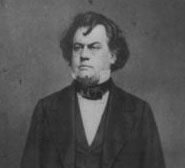by Senator Robert Toombs |
|
Sen. Robert Toombs...
GENTLEMEN OF THE GENERAL ASSEMBLY:
I very much regret, in appearing before you at your request, to address you on the present state of the country, and the prospect before us, that I can bring you no good tidings. The stern, steady march of events has brought us in conflict with our non-slaveholding confederates upon the fundamental principles of our compact of Union. We have not sought this conflict; we have sought too long to avoid it; our forbearance has been construed into weakness, our magnanimity into fear, until the vindication of our manhood, as well as the defence of our rights, is required at our hands. The door of conciliation and compromise is finally closed by our adversaries, and it remains only to us to meet the conflict with the dignity and firmness of men worthy of freedom. We need no declaration of independence. Above eighty-four years ago our fathers won that by the sword from Great Britain, and above seventy years ago Georgia, with the twelve other confederates, as free, sovereign, and independent States, having perfect governments already in existence, for purposes and objects clearly expressed, and with powers clearly defined, erected a common agent for the attainment of these purposes by the exercise of those powers, and called this agent the United States of America.
The basis, the corner-stone of this Government, was the perfect equality of the free, sovereign, and independent States which made it. They were unequal in population, wealth, and territorial extent - they had great diversities of interests, pursuits, institutions, and laws; but they had common interests, mainly exterior, which they proposed to protect by this common agent - a constitutional united government - without in any degree subjecting their inequalities and diversities to Federal control or action.
The instant the Government was organized, at the very first Congress, the Northern States evinced a general desire and purpose to use it for their own benefit, and to pervert its powers for sectional advantage, and they have steadily pursued that policy to this day. They demanded a monopoly of the business of ship- building, and got a prohibition against the sale of foreign ships to citizens of the United States, which exists to this day.
With these vast advantages, ordinary and extraordinary, one would have supposed the North would have been content, and would have at least respected the security and tranquility of such obedient and profitable brethren; but such is not human nature. They despised the patient victims of their avarice, and they very soon began a war upon our political rights and social institutions, marked by every act of perfidy and treachery which could add a darker hue to such a warfare.
We won liberty, sovereignty, and independence by the American Revolution - we endeavored to secure and perpetuate these blessings by means of our Constitution. The very men who use these arguments admit that this Constitution, this compact, is violated, broken and trampled under foot by the abolition party. Shall we surrender the jewels because their robbers and incendiaries have broken the casket? Is this the way to preserve liberty? I would as lief surrender it back to the British crown as to the abolitionists. I will defend it from both. Our purpose is to defend those liberties. What baser fate could befall us or this great experiment of free government than to have written upon its tomb: "Fell by the hands of abolitionists and the cowardice of its natural defenders." If we quail now, this will be its epitaph.
I am yet ready for the public service, when honor and duty call. I will serve you anywhere where it will not degrade and dishonor my country. Make my name infamous forever, if you will, but save Georgia. I have pointed out your wrongs, your danger, your duty. You have claimed nothing but that rights be respected and that justice be done. Emblazon it on your banner - fight for it, win it, or perish in the effort.
Orders may also be sent via U.S. Snail to:
Tel: (803) 661-3102 You may use this search feature to search either ResearchOnLine or the entire WWW. Google has indexed approximately 22,600 pages on this site.
Evans, Clement A.
Confederate Military History - Georgia Volume
$35.00

$15.00

Jones, Charles E.
Georgia in the War
$25.00


Ordering via EMAIL is easy.
Click Here
Eastern Digital Resources
5705 Sullivan Point Drive
Powder Springs, GA 30127
______________________________
______________________________

Abraham Lincoln:
Was He a Christian?
$25.00

Historical Sketch & Roster
Alabama 13th Infantry Regiment
$19.95

Dark Hours:
South Carolina Prisoners of War
$50.00
______________________________



